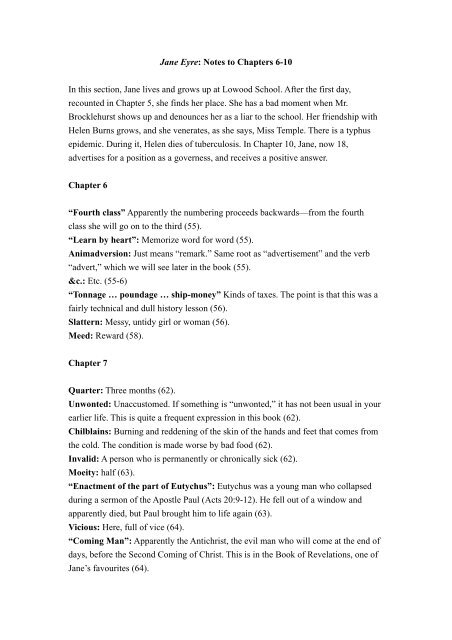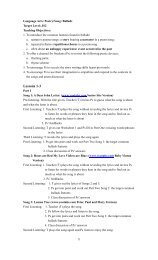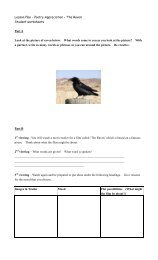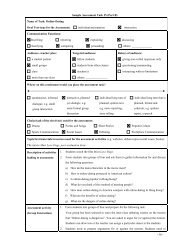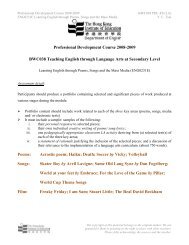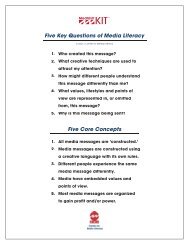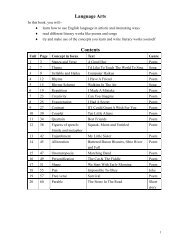Jane Eyre: Notes to Chapters 6-10
Jane Eyre: Notes to Chapters 6-10
Jane Eyre: Notes to Chapters 6-10
Create successful ePaper yourself
Turn your PDF publications into a flip-book with our unique Google optimized e-Paper software.
<strong>Jane</strong> <strong>Eyre</strong>: <strong>Notes</strong> <strong>to</strong> <strong>Chapters</strong> 6-<strong>10</strong><br />
In this section, <strong>Jane</strong> lives and grows up at Lowood School. After the first day,<br />
recounted in Chapter 5, she finds her place. She has a bad moment when Mr.<br />
Brocklehurst shows up and denounces her as a liar <strong>to</strong> the school. Her friendship with<br />
Helen Burns grows, and she venerates, as she says, Miss Temple. There is a typhus<br />
epidemic. During it, Helen dies of tuberculosis. In Chapter <strong>10</strong>, <strong>Jane</strong>, now 18,<br />
advertises for a position as a governess, and receives a positive answer.<br />
Chapter 6<br />
“Fourth class” Apparently the numbering proceeds backwards—from the fourth<br />
class she will go on <strong>to</strong> the third (55).<br />
“Learn by heart”: Memorize word for word (55).<br />
Animadversion: Just means “remark.” Same root as “advertisement” and the verb<br />
“advert,” which we will see later in the book (55).<br />
&c.: Etc. (55-6)<br />
“Tonnage … poundage … ship-money” Kinds of taxes. The point is that this was a<br />
fairly technical and dull his<strong>to</strong>ry lesson (56).<br />
Slattern: Messy, untidy girl or woman (56).<br />
Meed: Reward (58).<br />
Chapter 7<br />
Quarter: Three months (62).<br />
Unwonted: Unaccus<strong>to</strong>med. If something is “unwonted,” it has not been usual in your<br />
earlier life. This is quite a frequent expression in this book (62).<br />
Chilblains: Burning and reddening of the skin of the hands and feet that comes from<br />
the cold. The condition is made worse by bad food (62).<br />
Invalid: A person who is permanently or chronically sick (62).<br />
Moeity: half (63).<br />
“Enactment of the part of Eutychus”: Eutychus was a young man who collapsed<br />
during a sermon of the Apostle Paul (Acts 20:9-12). He fell out of a window and<br />
apparently died, but Paul brought him <strong>to</strong> life again (63).<br />
Vicious: Here, full of vice (64).<br />
“Coming Man”: Apparently the Antichrist, the evil man who will come at the end of<br />
days, before the Second Coming of Christ. This is in the Book of Revelations, one of<br />
<strong>Jane</strong>’s favourites (64).
“Sufferings of the primitive Christians”: Early Christians were the vicitms of<br />
persecution by Roman authorities. Most famously, they were fed <strong>to</strong> lions in front of<br />
Roman crowds (65).<br />
Hearth:<br />
http://riannanworld.typepad.com/my_weblog/images/hearth.JPG<br />
Perhaps it is not by accident that we’ve just heard about the little girls unable <strong>to</strong> get<br />
near the fire (65).<br />
“Conform <strong>to</strong> the world so openly”: This is a special religious sense of the word<br />
“world.” What is truly Christian is “not of this world” (66).<br />
Excrescence: Excessive growth, overflow, abnormal increase. Also, recalls<br />
“excrement” (66).<br />
“Cup and platter”: Another reference <strong>to</strong> the Bible. “And the Lord said un<strong>to</strong> him,<br />
Now do ye Pharisees make clean the outside of the cup and the platter; but your<br />
inward part is full of ravening and wickedness” (Luke 11:39). The Pharisees were<br />
Jews of a sect often accused of hypocrisy in the New Testament. There is complex<br />
irony here: The reference seems <strong>to</strong> accuse the girls of hypocrisy, but it is hard <strong>to</strong> see<br />
their resentment as “ravening and wickedness.” At the same time, the expression<br />
reflects the hypocrisy she sees in Mr. Brocklehurst (66).<br />
“My treacherous slate” Personification. <strong>Jane</strong> feels like the slate is alive, and has<br />
done something <strong>to</strong> hurt her (67).<br />
“The Rubicon was passed”: At one point in his life, Julius Caesar was the ruler of an<br />
area called Gaul, and the Roman Senate forbade him <strong>to</strong> enter Italy. When he crossed<br />
the Rubicon river in<strong>to</strong> Italy, it was the point of no return. We still use this expression<br />
(68).<br />
“Brahma … Juggernaut” Hindu gods, here used as examples of evil paganism (68).<br />
“the troubled pool of Bethesda”: This reference <strong>to</strong> the Bible (John 5) doesn’t seem<br />
<strong>to</strong> serve any purpose but <strong>to</strong> give Mr. Brocklehurst the chance <strong>to</strong> look holy (68).
Lineaments: shape of a face (69).<br />
“Such spots are there on the disc of the clearest planet”: This is a reference <strong>to</strong> the<br />
old idea that everything on this earth, and up <strong>to</strong> the Moon, is imperfect. What is<br />
beyond is God’s domain, and is perfect. By this time, though, telescopes had been<br />
invented, and people knew that there were spots on the surfaces of all planets. Later<br />
we will see the expression sublunary, meaning all that is imperfect on this earth (69).<br />
Chapter 8<br />
“Approbation”: Approval (70).<br />
“Ardent”: From a Latin word meaning “burning” (71).<br />
“Alloy”: A mixture of metals. Here, by a metaphor, tranquillity is alloyed with<br />
sadness. Similarly, unalloyed happiness (71).<br />
“gall and wormwood”: Gall is a bitter liquid inside your gut (produced by your<br />
gallbladder), and wormwood, a bitter plant substance sometimes used as medicine.<br />
The phrase is again biblical, representing the bitterness that God would bring down on<br />
Windows Media Player.lnk<br />
the Israelites if they turned <strong>to</strong> worhipping idols (72).


